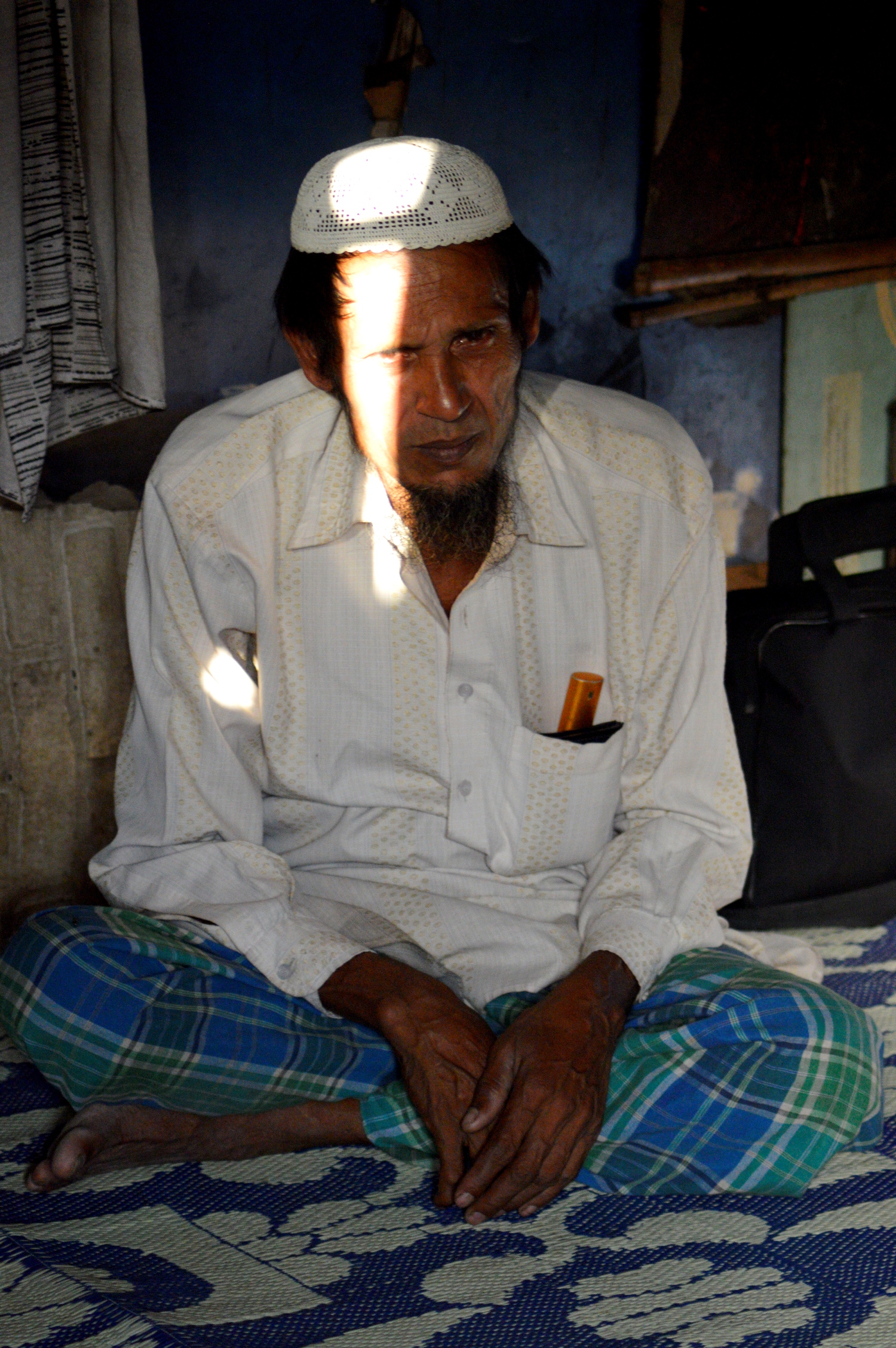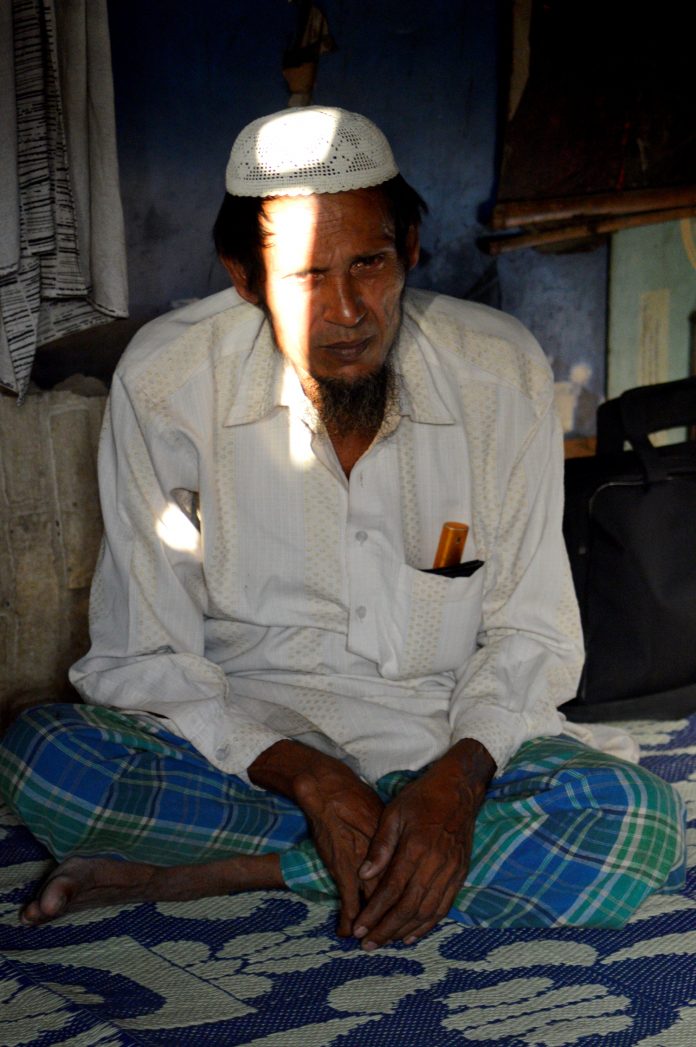
What does a Rohingya feel when he is told that he is an ‘illegal immigrant’, a ‘security threat’ and ‘unwanted’ in India? What was their life like before they had to run away to save themselves? What does it feel to be reduced to just a statistic? What do the Rohingyas feel when they hear the news that they will be deported back to the land where their lives are in danger? In a five-part series, Raqib Hameed Naik speaks to five refugees who had to give up all they owned to attempt a start a new life. Their stories, in the first person, are an attempt to go beyond majoritarian narratives and give them a platform to express their views and opinions. In the last of the five-part series, we listen to Mohammed Yusuf.
Mohammad Yousuf, 55, belongs to Daibina village in the Rakhine state of Myanmar. He has eight children- four boys and four girls. He has stopped working after diagnosed with Asthma. His four boys work as labourers at construction sites in Delhi to feed his family of ten members. He fled his village in 2009. This is his story.
My name is Mohammad Yousuf and I am from Daibina village in Rakhine state. I had large agricultural fields of rice and coconut and used to feed my family by selling the harvest. Even after spending from the sale of harvest, I used to save a small amount.
I had a good pacca house there made of bamboo and a brick wall surrounding the perimeter. The house was well built to withstand the hot summers and rainy seasons. Fish was our main food. I have eight children- four boys and four girls all in their twenties.
Every morning I used to go out in the fields and work late till evening and come back tried and rest.
But even after being tired, I had to stay alert. My situation was like a deer who in forest remains alert from other animals anticipating an attack him. I had to stay alert 24 hours a day from being attacked by the Army or the local Buddhist population.
The antagonism against our community was at peak during those times. The Buddhists used to think that we were becoming a majority and they the minority and perceived it as a threat to their existence. But we were not!
Army used to make surprise visits to our villages. From a child to an old man, everyone dreaded even the mention of name “military”. I still remember how I and my son had to run for our lives while eating, working and sometimes even while sleeping because most of the time military used to raid during the night.
I don’t even think there would have been any day if I had slept peacefully in my country. For us, Police, Military and local Buddhists evoked similar fear. Every one among them was after our lives.
The Army used to come to our villages for routine patrols and take us forcibly to carry their stuff deep into the mountains as there were no roads. They used to use us as porters for weeks. Leave alone paying us for the work, they didn’t even use to feed us. Many times I crashed on the ground, unconscious without eating for days. We were treated like dogs.
The army had set up check posts in our villages and assigned local Rohingyas to keep watch at the night only to not let them sleep. Sometimes they used to sneak in our villages to see if we were sleeping or not. Irrespective of the fact that anyone was sleeping or not, they used to take our livestock and grains and money as a bribe.
In the backdrop of continuous harassment and putting an end to the atrocities, I decided to leave Myanmar in 2009 and come back only after peace returns.
In Bangladesh, I stayed for two years and worked as a labourer to support my family despite suffering from asthma.
I was in touch with my relatives who had left Myanmar long back and they told me that India has good laws, they don’t harass refugees besides people are very welcoming and UNHCR also helps Rohingya.
I decided to leave Bangladesh and rented a hut in Shram Vihar. Initially, I started working at a poultry farm, then in a meat processing unit, but my health deteriorated which didn’t allow me to continue. Now I can barely walk few steps. During summers, I experience chronic breathlessness but at least I am at peace that I will not die from the army bullet.
Now my four children work as labourers at construction sites and they run the house.
The most important thing I liked about India is that here people have freedom of movement. I can go to any state without taking permission from anyone, but in Myanmar, we had to take permission from local authorities even to travel between villages.
But lately, I have been hearing that Indian government is sending us back. My children kept it as a secret from me. I heard about it from the other Rohingya elders. I was in shock for at least a week. Why don’t the government realize that we will be dead if they send us back? Don’t they see lakhs of Rohingyas taking refuge in Bangladesh fleeing persecution by the army in our country?
This Eid-Al-Azha, my cousin brother and his whole family were murdered by the Myanmar army. They were shot inside their own house. We are not asking for citizenship. We are asking for time. India is a powerful nation. Instead of using its power to throw us away, the government should work on negotiating some solution to our problems in Myanmar. Nobody needs to issue any orders then. We will leave on our own!

